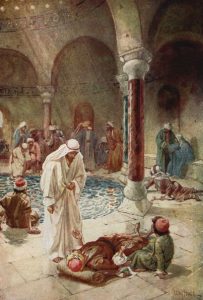
THE TITLE is straightforward. It minces no words.
Many people in the churches cannot make up their minds about the deity of Jesus Christ. Can you blame them when some preachers are not even sure themselves?
I believe there is a way to settle the controversy, and that is to bring in the testimony of those who first faced the issue before there ever was a Christian church.
I am talking about the testimony of Jesus himself and the words of the witnesses who heard him. So, let us try and give the case a hearing.
The story is recorded for us in John chapter 5.
Jesus healed a lame man on the Sabbath. The man, now walking, run into some Jews who confronted him. “It is the Sabbath; the law forbids you to carry your mat” (5:10).
The healed man defended himself: “The man who made me well said to me, ‘Pick up your mat and walk’” (5:11).
These Jews (see note below)* persecuted Jesus after learning he was the one who performed the Sabbath healing.
The answer of Jesus is jaw-dropping: “My Father is always at his work to this very day, and I too, am working” (5:17, all emphases are mine).
Did you hear that?
Jesus is saying the healing of the lame man was as much the work of the Father as it was his!
That is, there is no difference! His work was God’s work.
Are you with me on this? If Jesus broke the Sabbath, so did God!
The implication of this rattled the Jews who were there. They proceeded to denounce Jesus.
“For this reason the Jews tried all the harder to kill him; not only was he breaking the Sabbath, but he was calling God his own Father, making himself equal with God” (5:18).
This means Jesus’ words were taken at their face value. In effect Jesus was saying there was no difference between him and the Father. The work that he did was as much his as it was God’s.
Now these Jews have a real argument in their hands. They made the only logical connection possible under the premises. For “calling God his own Father” they concluded Jesus was “making himself equal with God” – the sin of blasphemy which was punishable by death!
This was too much for the un-believing Jews. They wanted to defend God’s honor so now they must have Jesus killed.
So here are important questions: One, did the Jews who heard Jesus correctly interpret what Jesus said?
Two, did Jesus understand the “equality” charge? Three, did he contest it?
If we let the text speak for itself the answer to the first 2 questions is YES! It is NO for the third.
Jesus was not lying when he claimed the work that he did was as much God’s work as it was his. And hefully understood the equality charge. In fact, Jesus admitted he was equal with God if we hear the rest of what he says in his own defense. He said a few more things to establish his unique relationship with God whom he called “my Father”:
- He “can do nothing by himself; he can only do what he sees his Father is doing”;
- “[w]hatever the Father does the Son also does”;
- The Father “loves the Son and shows him all he does”; and
- “[t]hat all may honor the Son just as they honor the Father” (5:19-23a).
Now it is Jesus’ turn to make a charge: “He who does not honor the Son does not honor the Father, who sent him” (5:23b).
Because of what Jesus said about himself and God his enemies made up their mind to kill him.
And in the end, they did.
Today, many who take the plain meaning of Jesus’ words in the Gospel would be just as scandalized as the Jews who were in Temple that day back in the first century.
So now I have serious questions for those who cannot make up their mind about the deity of Jesus but still claim to honor God and believe in Him. Did the enemies of Jesus have a case? And If Jesus were alive today and you hear the exact same words that earned him the charge of blasphemy – a sin punishable by death – how would you resolve the case for yourself? What would your verdict be?
Was Jesus guilty as charged? I mean, under the exact same law would you also want to sentence Jesus to death? Would you do that? And if so, could you then still claim to be honoring God and a follower of Jesus?
*Note: We need to clarify one important matter about the story as we find it in John’s Gospel. The “Jews” figure in the controversy described in John’s Gospel. The designation does not include all Jews, then or now, for the original believers of Jesus then were Jews, the apostles included, and there are many Jews who believe in him now. In fact, the success of the spread of Christianity in the world years after the crucifixion of the Messiah can be attributed to the effort of Paul, himself a Jew. John’s use of the term “Jews” had polemic (not pejorative!) intent. It came to designate a religious party of men in John’s day who zealously resisted Jesus because they believed his teachings ran counter to the law of Moses as they understood it.
